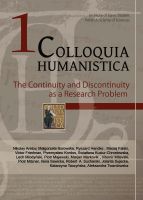The Balkan Sprachbund in the Republic of Macedonia Today: “Eurology” as Discontinuity and Dialectology as Continuity
The Balkan Sprachbund in the Republic of Macedonia Today: “Eurology” as Discontinuity and Dialectology as Continuity
Author(s): Victor FriedmanSubject(s): Language and Literature Studies
Published by: Instytut Slawistyki Polskiej Akademii Nauk
Keywords: Macedonian Language; Balkan Languages; "Eurology"; multilingualism
Summary/Abstract: Although almost a century has passed since the final dissolution of the Ottoman Empire, and despite the relatively recent penetration of West European languages to all levels of social life, the conditions that produced the Balkan linguistic league continue to exist on the level of regions and communities. Of particular note is the complexity of multilingualism in the Republic of Macedonia, where patterns of Balkan innovation continue to operate even today. This in turn gives evidence of enduring mechanisms of language contact. Moreover, for various historical reasons, Macedonia continues to function at the heart of Balkan innovation.1 Thus, for example, the modern spread of double prepositions from southwest to northeast in Macedonian is following the path of the spread of the ‘have’ perfect in previous centuries and is doing so for similar reasons related to Aromanian; the Albanian and Macedonian languages continue to influence one another despite the divisiveness of national politics; Romani continues to respond to its multilingual environment while at the same time engaging in new forms of conservatism. From these and other examples we can conclude that not only does the history of the Balkan linguistic league merit continued investigation, but so does its present. In this contribution I shall argue the case for a continuation of Balkan linguistics through the study of sites of living language contact, i.e. urban neighborhoods and multilingual villages. This approach differs significantly from that of traditional dialectology, deeply implicated in the formation of modern national ideologies.
Journal: Colloquia Humanistica
- Issue Year: 2012
- Issue No: 1
- Page Range: 115-124
- Page Count: 10
- Language: English

